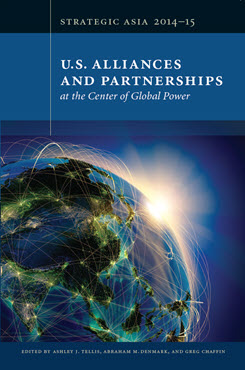The U.S.-Japan Alliance
Prospects to Strengthen the Asia-Pacific Order
This chapter from Strategic Asia 2014–15examines Japan’s emerging foreign policy strategy, including efforts to strengthen the U.S.-Japan alliance, and posits that the alignment of strategic objectives enhances the prospects for the alliance to shape the economic and security architecture of the Asia-Pacific.
EXECUTIVE SUMMARY
This chapter examines Japan’s emerging foreign policy strategy, including efforts to strengthen the U.S.-Japan alliance, and posits that the alignment of strategic objectives enhances the prospects for the alliance to shape the economic and security architecture of the Asia-Pacific.
MAIN ARGUMENT
Japan has unveiled a comprehensive strategy centered on economic revitalization, diplomacy in support of international rules and norms, and investments in defense capabilities to strengthen deterrence against emerging threats and enhance cooperation with like-minded countries. The U.S.-Japan alliance, as the cornerstone of Japanese foreign policy, has a central role to play in realizing this strategic vision for Japan’s future. Japan’s emerging economic, diplomatic, and security initiatives mirror the objectives of the U.S. strategic rebalance to the Asia-Pacific, and the convergence of these two strategies presents an opportunity for joint leadership in strengthening the regional order.
POLICY IMPLICATIONS
- Economic power is the foundation of Japan’s strategy to enhance its leadership role in international affairs, and the U.S. has a strategic interest in supporting Japan’s path toward sustainable growth and in strengthening bilateral economic cooperation as a catalyst for shaping the rules and norms of Asia-Pacific economic integration.
- The introduction of defense reforms, including measures that would allow Japan to exercise the right of collective self-defense, suggests the potential to expand the parameters for U.S.-Japan defense cooperation, enhance coordination with like-minded countries in the Asia-Pacific, and establish a balance of power that favors regional stability.
- Sustaining bilateral strategic dialogue at senior levels will be critical to ensuring that the diplomatic, economic, and security strategies of the two governments remain complementary and ultimately help shape the regional order.
Strategic Asia
The Strategic Asia annual edited volume incorporates assessments of economic, political, and military trends and focuses on the strategies that drive policy in the region. Learn more about Strategic Asia.


